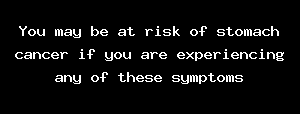profile/9598IMG-20200827-WA0010.jpg
Philipo345

You May Be At Risk Of Stomach Cancer If You Are Experiencing Any Of These Symptoms
~3.5 mins read
You May Be At Risk Of Stomach Cancer If You Are Experiencing Any Of These Symptoms
Symptoms cancer usually begins in the mucus-producing cells that line the stomach. This type of cancer is called adenocarcinoma.
For the past several decades, rates of cancer in the main part of the stomach (stomach body) have been falling worldwide. During the same period, cancer in the area where the top part of the stomach (cardia) meets the lower end of the swallowing tube (esophagus) has become much more common. This area of the stomach is called the gastroesophageal junction.
Symptoms
Signs and symptoms of gastroesophageal junction
cancer and stomach cancer may include
•Fatigue
•Feeling bloated after eating
•Feeling full after eating small amounts of
food
•Severe, persistent heartburn
•Severe indigestion that is always present
•Unexplained, persistent nausea
•Stomach pain
•Persistent vomiting
•Unintentional weight loss
When to see a doctor
If you have signs and symptoms that worry you, make an appointment with your doctor. Your doctor will likely investigate more common causes
of these signs and symptoms first.
Causes
In general, cancer begins when an error (mutation) occurs in a cell's DNA. The mutation causes the cell to grow and divide at a rapid rate and to continue living when a normal cell would die. The accumulating cancerous cells form a tumor that can invade nearby structures. And cancer cells can break off from the tumor to spread throughout the body.
Gastroesophageal junction cancer is associated with having gastrointestinal reflux disease (GERD), and less strongly, with obesity and smoking. GERD is a condition caused by frequent backflow of
stomach acid into the esophagus.
There is a strong correlation between a diet high in smoked and salted foods and stomach cancer located in the main part of the stomach. As the use of refrigeration for preserving foods has
increased around the world, the rates of stomach cancer have declined.
Risk factors
The main risk factors for gastroesophageal junction cancer are a history of GERD and obesity.
Factors that increase your risk of stomach cancer located in the stomach body include:
•A diet high in salty and smoked foods.
•A diet low in fruits and vegetables.
•Eating foods contaminated with a fungus
called aflatoxin.
•Family history of stomach cancer.
•Infection with Helicobacter pylori.
•Long-term stomach inflammation.
•Pernicious anemia.
•Smoking.
•Stomach polyps.
Prevention
It's not clear what causes gastroesophageal junction or stomach cancer, so there's no way to prevent it. But you can take steps to reduce your risk of gastroesophageal junction cancer and
stomach cancer by making small changes to your everyday life. For instance, try to;
•Exercise. Regular exercise is associated with a reduced risk of stomach cancer. Try to fit physical activity into your day most days of week
•Eat more fruits and vegetables. Try to
incorporate more fruits and vegetables into your diet each day. Choose a wide variety of colorful fruits and vegetables.
•Reduce the amount of salty and smoked
foods you eat. Protect your stomach by
limiting these foods.
•Stop smoking. If you smoke, quit. If you don't, smoke don't start. Smoking increases your risk of stomach cancer, as well as many other types of cancer. Quitting smoking can be very, difficult so ask your doctor for help.
Ask your doctor about your risk of
gastroesophageal junction or stomach
cancer. Talk with your doctor it you have an increased risk of gastroesophageal junction cancer or stomach cancer. Together you may consider periodic endoscopy to look for signs of stomach cancer.
Please do feel free to like, comment and share if this article benefits you.
Advertisement

Link socials
Matches
Loading...
